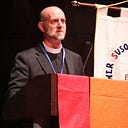Member-only story
Review and Response to “The Evangelicals” by Frances Fitzgerald, part 2
Last week I wrote part 1 of my review for this book and you can read it here.
Today I pick up with a new section starting in 1900. The author starts to make the shift to the underlying conflict that will plague the Evangelical movement going forward — the conflict between fundamentalist and modernist ways of seeing the world. Fundamentalism will have a significant impact on evangelicalism. While the two are closely related and often appear indistinguishable to the untrained eye, there are key differences. Having said that, it can not be denied that fundamentalism has left its mark on evangelicalism.
As a really quick history, fundamentalism arose in response to a more liberal theology that was taking hold of most major seminaries and divinity schools in the US (pg. 95). Much of this conflict is centered on the idea of biblical infallibility — the inability of Scripture to be wrong and that it should be interpreted literally. The Scopes trial would come about during this period.
If you want a summation of what the rise of fundamentalism means, along with it’s views of biblical inerrancy, here’s what Fitzgerald writes, “In a movement that depended on absolute certainty about biblical dates and the identity of such figures as Gog and Magog, there could be no compromise and, as the Byzantine disputes of old, the quarrel turned ugly.” (pg. 99)
